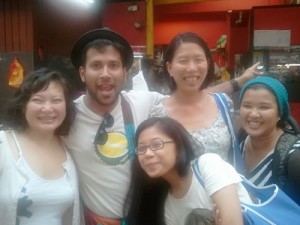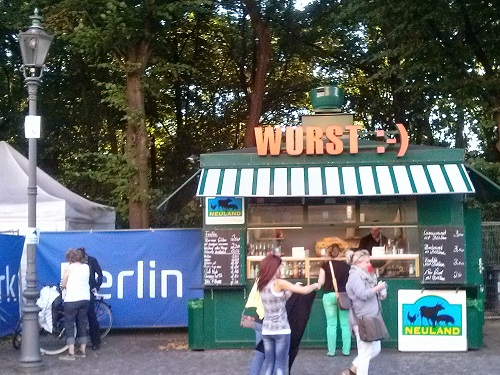I thought I’d write a follow up post to pair up with what I wrote last week on In Defense of the ‘Tourist’.
As I said, you can’t avoid being the tourist, but you can avoid being that tourist. Even the most touristy destinations have local areas that will give you an insight into the lives and soul of the place. It is about your willingness to explore and learn that will enrich your travel experience.

Here’s how you can enjoy the attractions at the same time, avoid ‘tourist traps’.
Learn a few local phrases
I aim not to be as snobby a traveller as I used to be, but I still find myself appalled at people who doesn’t respect the local language and expect to be understood when they are demanding services in English. A brash English speaking tourist striding up to the counter and immediately launches into “Excuse me, where’s your service department” loudly, without even a greeting, checking if the person spoke English or a please, embarrasses me greatly. As a fellow English speaking tourist, I cringe and say a silent sorry on behalf.
Hey, if we are not expected to speak French, German, Spanish, Chinese, Malay to the tourists that visit our cities, why should we insist that they speak our language when we visit them?
Learning a language is hard, and it is impossible to be fluent in all the languages of all the places you want to visit. However, learning a few phrases only take a few days of memorising, and it’ll take you a long way.
If you have a bit more time, learn how to say more of the basics such as “where is”, and little other vocabulary associated with food or activities (whatever that is most comment for you when you travel). Never worry about getting it wrong! You never know you might just make a friend for your efforts.
Aim to greet, say please, say thank you and good bye at a minimum in the local tongue. Even if you are speaking it badly, it’ll be appreciated and you’ll notice the difference in their treatment of you when you do give it a go.
I once made the notoriously grumpy Polish border guards smile just for attempting a ‘thank you’ in Polish when he returned my passport. I am just saying.
Stay away from ‘Centralised Locations’
Many accommodations will advertise being in a centralised location as a good thing. Sure, if you only have a limited time then it might be better for you to be centralised so you can see as many attractions as possible without spending hours trying to get there. However, if you really want to have a more local experience then I suggest to choose those options that are a bit away from the attractions.

Do some research and find an accommodation that doesn’t have an attraction within 2 blocks of its location. Even better if you have to catch a bus or a tram and then walk around the corner to get to.
Why? Because it forces you to go beyond the tourist boundaries, it forces you to navigate in areas that doesn’t have a large icon on the map to indicate its location and it gives you the opportunity to see different parts of the place that isn’t listed as a tourist attraction.
I love Airbnb for this reason. You can often find some excellent accommodation options in places where locals actually live, at the same time, having a local contact to advise you where the local eateries and hang outs are.
Take public transport, or walk
Public transports go places, and sometimes I get on one without really knowing where it’ll lead me because you never know what surprises are around the corner (and even if it doesn’t go anywhere, you can simply just hop across the road/platform and get the same route back).

This goes hand in hand with staying away from a centralised location. Many tourists will choose the easy way out and get taxies everywhere, but one way to experience how the locals live is to take public transport.
Get the Metro in Paris, the Underground in London, the Subway in New York, the Collectivos in Peru and the Jeepneys in the Philippines. Get squished up with locals going to work or off to the markets, attempt to navigate the routes and change points by asking someone on the platforms, work out the bus numbers and how they are linked are all part of a great travelling experience.
Be brave. Squeeze in. Sit next to someone holding a chicken, ask to be taken to the last stop. Get on a bus without knowing where it is going. Be adventurous!
There is absolutely no point, in complaining that you never got to experience the local way of life, if you have ordered a private chauffeur and joined a group tour. So get your adventurous spirit on and get on that bus/tram/shared minivan etc. Not to mention, you will get to see different areas along the way, and you might just find that lovely little corner of the place you have always been looking for.
Of course, walking is always a good option. It’s free, you can wander down small streets and find that secret little spot that only you would know, and you are physically moving, keeping you fit during your travels at the same time.
Eat where the menu isn’t in English (unless you are in an English speaking country)
If you have complained that certain places are always too expensive and are ‘tourist traps’, then you already know the solution: eat somewhere else.
Better – eat where the menu isn’t in English.

Don’t succumb to convenience, both in location and in language. When we travel we don’t ever eat in hotel restaurants and would walk at least a block or two away from main attractions before considering for a place to eat, and we always look for places without an English menu first.
I am not saying place with English menus are less authentic and not nice. That is certainly not true because I have eaten in places where the English menu is simply a convenience for the owner to attract more people to come, but the food is absolutely how a local likes it.
If you really want to get into the local groove, then eat local. Take a risk and pick a dish out of the names you can’t pronounce, check out what other diners are eating and say I’ll have one of those.
If you are already staying somewhere further away, as previously recommended, then you are already one step ahead of others who has chosen to stay near the attractions. Otherwise, if you really don’t know where to go, here’s a suggestions: start at the university.
In places where there is a university (or two) will always have places where students like to hang out. These are the places you should check out because student areas are often catered for students, so will be cheaper and livelier. It is also where you are less likely going to be treated as a tourist and (dependent on your age) more like an international student or a visiting professor.
For places without universities, even if you ask a local, they’ll still point you to places where they think you should eat. So, the question you ask is very important. If you simply ask “Where are some of the good restaurants?” you are definitely going to get the same suggestions as what’s been listed in your tourist guide.
What you really should ask is: “Where do YOU go to eat?”
Then, have a conversation with them. Ask them why they like it, what their favourite dishes there are and how you can get there. Then, mostly importantly, ask how much it might cost you to eat there.
People love talking about themselves. These questions are less intrusive and more likely to make them feel like a friend to you rather than just an information source, so you are more likely to get an honest answer.
Before you go, make sure you are aware of the currency conversions though. Don’t forget, you are a tourist, and you do not speak the local language. In certain places you are likely to get ripped off so know the expected amount before you go. It’s always better to only pay $1-$2 more than $15 more than the same food.

Make a local friend (or two!)
Can you chat a stranger up and immediate befriend them? If so, lucky you, you’ll have no problem making local friends so that you can ask if they could show you places where there are less tourist presence.
Otherwise, make some introductions of your own. Communities such as Hospitality Club and Couch Surfing are not just for backpackers who let each other stay on their spare beds/couches. You are also able to contact them and ask them out just for a coffee. Read people’s profiles and find someone who share the same interests as you and see if there are anything you can do together.
In Rome, I stayed with a fellow journalist who worked graveyard hours. However, we shared the same passion for music and food, so after he’s woken up from his late night shift, we would venture out to his favourite pizza joint for a bite, and then join some of the community concerts that is happening around the neighbourhood.
Is there a festival happening where you are? Do you see people dancing on the streets? Join in!

Contrary to what your parents may have taught you, it is ok to speak to strangers! Use your common sense and select those that have a full profile with an honest picture, but you’ll find there is nothing scary about making friends. You even get to practice your local language and improve on it too.
Now I am not saying you have to do these all the time. Sometimes, you really just want a holiday. It is ok to mix it up a little, it’s your trip, not mine!
Happy Travels!


 My Wurst Months (and Other German Street Food)
My Wurst Months (and Other German Street Food)
Share your thoughts below!